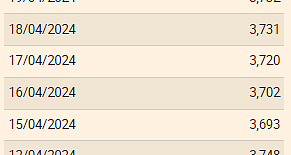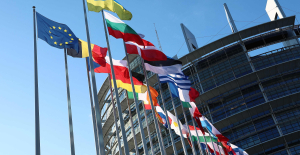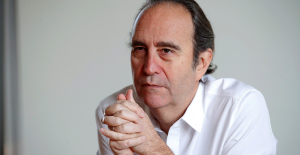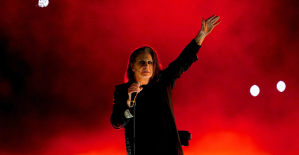"The way is clear: Europe remains technology-neutral," said Federal Transport Minister Volker Wissing (FDP) after the traffic light government had reached an agreement with the EU Commission on Friday in the combustion dispute. Even after 2035, new cars with combustion engines may be registered - provided they use greenhouse gas-neutral fuels such as e-fuels.
How promising synthetic fuels are - and what role they can play on the way to climate neutrality was the topic of the ARD political talk "Anne Will" on Sunday evening. "No more gas, oil, diesel and petrol - does the traffic light have a plan for this?" was the question asked by the members of the Bundestag Jürgen Trittin (Greens), Konstantin Kuhle (FDP) and Jens Spahn (CDU) as well as the "Zeit" Journalist Petra Pinzler and Lamia Messari-Becker, Professor of Building Technology and Building Physics discussed.
"I'm glad he managed to do that," said FDP politician Kuhle at the beginning of the show, praising his fellow party member Wissing, who insisted on exceptions for vehicles that use synthetic fuels. Thanks to the FDP, an “additional technology for climate protection” is available, Kuhle was convinced.
Kuhle criticized the discussion about e-fuels: "This whole e-fuels debate is always being waged as a religious war between those who only want e-mobility and those who allegedly only want e-fuels." FDP always subordinate. "But that's not true at all," says Kuhle. The expansion of electric mobility in Germany and the European Union is of central importance. However, e-fuels are a supplement - and are also required for ships, aircraft and the existing fleet with combustion engines.
With regard to e-mobility, Green Party politician Jürgen Trittin sees a “terrible backlog” that needs to be addressed as soon as possible. In his opinion, there is a demand for e-fuels above all in industry: "We need them for BASF," says Trittin. However, the former Federal Minister for the Environment was satisfied that the “hanging game” at European level had ended.
The CDU member of the Bundestag Jens Spahn contradicted this representation. "Germany has lost a lot of its reputation through this approach," criticized the deputy chairman of the Union parliamentary group. "A lot of damage" was caused at the procedural level.
In addition to the party politicians, Lamia Messari-Becker, who made keynote speeches several times, also caught the eye. The expert for building technology and building physics called it a "basic mistake" that the energy transition is focused on electricity. "Openness to technology is what characterizes this country," says Messari-Becker.
For its energy requirements, Germany needs ten times as much energy as it produces. According to the scientist, it is impossible to supply buildings, industry and transport only with electricity. However, diversification can ensure security of supply. In the heating sector, she listed district heating, geothermal energy or hydrogen from in-house photovoltaic electricity in this context.
The group reacted to the engineer's presentation by coming to terms with the past. The "Zeit" journalist Pinzler criticized that the issue of the heat transition had been "overslept for many years under the Merkel government". Horst Seehofer (CDU) "simply did nothing" as housing minister.
The CDU has "completely slowed down" renewable energies, also criticized Trittin. Above all, the former Economics Minister Peter Altmaier (CDU) drove the "photovoltaic industry out of Germany", which cost 100,000 jobs. An accusation that CDU politician Jens Spahn rejected. "We have achieved more than twice as much" as Trittin as Minister for 2020 "issued as a goal and slogan".
Scientist Messari-Becker prompted the statements to a sweeping attack: "We need a heat transition, which everyone involved who is sitting at the table have prevented." This should have started 30 years ago, she criticized. But since this was delayed and now only the heat pump is being propagated, Germany is running towards an artificial shortage - towards "a bottleneck that is killing us". This would result in “social hardship without major climate protection”.
In order to cushion the consequences, the scientist advocated a slower approach - and addressed an appeal to those responsible in politics: "My problem is the speed. I ask you to just give people more time and more options to go along with it.”
"Kick-off Politics" is WELT's daily news podcast. The most important topic analyzed by WELT editors and the dates of the day. Subscribe to the podcast on Spotify, Apple Podcasts, Amazon Music, among others, or directly via RSS feed.

 The Euribor today remains at 3.734%
The Euribor today remains at 3.734% Germany: the trial of an AfD leader, accused of chanting a Nazi slogan, resumes this Tuesday
Germany: the trial of an AfD leader, accused of chanting a Nazi slogan, resumes this Tuesday New York: at Columbia University, the anti-Semitic drift of pro-Palestinian demonstrations
New York: at Columbia University, the anti-Semitic drift of pro-Palestinian demonstrations What is Akila, the mission in which the Charles de Gaulle is participating under NATO command?
What is Akila, the mission in which the Charles de Gaulle is participating under NATO command? What High Blood Pressure Does to Your Body (And Why It Should Be Treated)
What High Blood Pressure Does to Your Body (And Why It Should Be Treated) Vaccination in France has progressed in 2023, rejoices Public Health France
Vaccination in France has progressed in 2023, rejoices Public Health France Food additives suspected of promoting cardiovascular diseases
Food additives suspected of promoting cardiovascular diseases “Even morphine doesn’t work”: Léane, 17, victim of the adverse effects of an antibiotic
“Even morphine doesn’t work”: Léane, 17, victim of the adverse effects of an antibiotic MEPs validate reform of EU budgetary rules
MEPs validate reform of EU budgetary rules “Public Transport Paris 2024”, the application for Olympic Games spectators, is available
“Public Transport Paris 2024”, the application for Olympic Games spectators, is available Spotify goes green in the first quarter and sees its number of paying subscribers increase
Spotify goes green in the first quarter and sees its number of paying subscribers increase Xavier Niel finalizes the sale of his shares in the Le Monde group to an independent fund
Xavier Niel finalizes the sale of his shares in the Le Monde group to an independent fund Owner of Blondie and Shakira catalogs in favor of $1.5 billion offer
Owner of Blondie and Shakira catalogs in favor of $1.5 billion offer Cher et Ozzy Osbourne rejoignent le Rock and Roll Hall of Fame
Cher et Ozzy Osbourne rejoignent le Rock and Roll Hall of Fame Three months before the Olympic Games, festivals and concert halls fear paying the price
Three months before the Olympic Games, festivals and concert halls fear paying the price With Brigitte Macron, Aya Nakamura sows new clues about her participation in the Olympics
With Brigitte Macron, Aya Nakamura sows new clues about her participation in the Olympics Skoda Kodiaq 2024: a 'beast' plug-in hybrid SUV
Skoda Kodiaq 2024: a 'beast' plug-in hybrid SUV Tesla launches a new Model Y with 600 km of autonomy at a "more accessible price"
Tesla launches a new Model Y with 600 km of autonomy at a "more accessible price" The 10 best-selling cars in March 2024 in Spain: sales fall due to Easter
The 10 best-selling cars in March 2024 in Spain: sales fall due to Easter A private jet company buys more than 100 flying cars
A private jet company buys more than 100 flying cars This is how housing prices have changed in Spain in the last decade
This is how housing prices have changed in Spain in the last decade The home mortgage firm drops 10% in January and interest soars to 3.46%
The home mortgage firm drops 10% in January and interest soars to 3.46% The jewel of the Rocío de Nagüeles urbanization: a dream villa in Marbella
The jewel of the Rocío de Nagüeles urbanization: a dream villa in Marbella Rental prices grow by 7.3% in February: where does it go up and where does it go down?
Rental prices grow by 7.3% in February: where does it go up and where does it go down? Europeans: “All those who claim that we don’t need Europe are liars”, criticizes Bayrou
Europeans: “All those who claim that we don’t need Europe are liars”, criticizes Bayrou With the promise of a “real burst of authority”, Gabriel Attal provokes the ire of the opposition
With the promise of a “real burst of authority”, Gabriel Attal provokes the ire of the opposition Europeans: the schedule of debates to follow between now and June 9
Europeans: the schedule of debates to follow between now and June 9 Europeans: “In France, there is a left and there is a right,” assures Bellamy
Europeans: “In France, there is a left and there is a right,” assures Bellamy These French cities that will boycott the World Cup in Qatar
These French cities that will boycott the World Cup in Qatar Serie A: Bologna surprises AS Rome in the race for the C1
Serie A: Bologna surprises AS Rome in the race for the C1 Serie A: Marcus Thuram king of Italy, end of the debate for the position of number 9 with the Blues?
Serie A: Marcus Thuram king of Italy, end of the debate for the position of number 9 with the Blues? Milan AC-Inter Milan: Thuram and Pavard impeccable, Hernandez helpless… The tops and flops of the derby
Milan AC-Inter Milan: Thuram and Pavard impeccable, Hernandez helpless… The tops and flops of the derby Ligue 2: Auxerre leader, Bordeaux in crisis, play-offs... 5 questions about an exciting end of the season
Ligue 2: Auxerre leader, Bordeaux in crisis, play-offs... 5 questions about an exciting end of the season


















